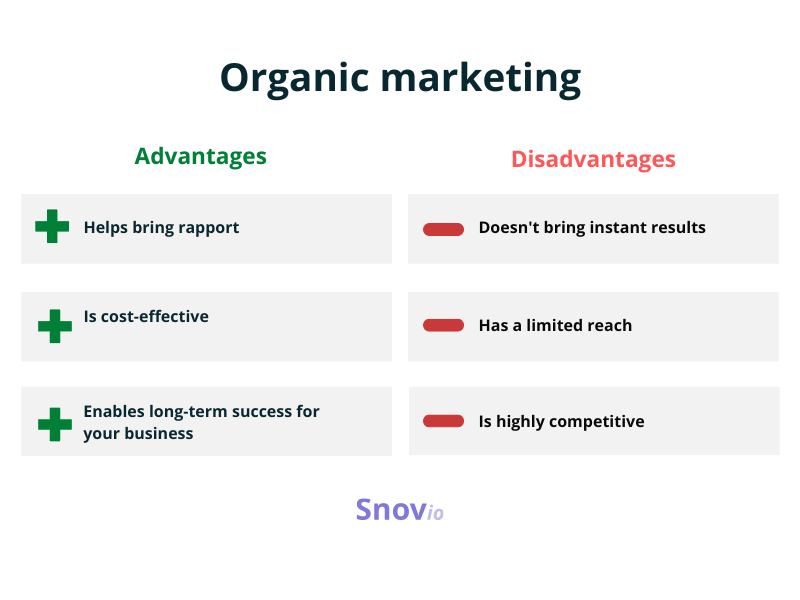Are you tired of constantly spending money on paid marketing campaigns with diminishing returns? Want to build long-lasting connections with your audience while steadily growing your business? If so, it’s time to dive into the world of organic marketing.
What is Organic Marketing? In a nutshell, organic marketing is a strategy that generates traffic to your business over time using non-paid methods, such as creating blog posts, case studies, guest posts, and updating social media accounts. By focusing on building brand awareness and connections with your audience, you can drive organic traffic and create a strong foundation for long-term business growth. But don’t just take our word for it – a study from HubSpot highlights the fact that “the main goal of organic marketing is to increase brand awareness and build a connection with your audience whether through educational or entertaining content.” [^1^]
Now that you have an overview of organic marketing, let’s dive deeper into its components and benefits, as well as proven strategies to help you craft the perfect organic marketing plan for your business. Keep reading to discover how you can master the art of organic marketing and set your business up for long-term success.
[^1^]: https://blog.hubspot.com/marketing/organic-marketing
Components of Organic Marketing
Organic marketing involves various forms of content which could range from blog posts and e-books to infographics and videos. Think about it, every time you update your website or post on social media, you’re essentially practicing organic marketing.
Blog posts: Engaging, educational, and updated regularly, blog posts are the cornerstone of content marketing. They drive traffic to your website and establish your brand as a thought leader in your industry. For real life examples and effective strategies, consider reading our guide on SEO-optimized blogging and Content Marketing.
Case studies: These provide proof that your product or service delivers. A well-documented case study can convert a skeptical visitor into a potential lead.
Guest posts: Offering your insights on other platforms not only adds to your credibility but also expands your audience reach. Collaborating with industry influencers and respected websites can increase your visibility manifold.
Unpaid social media updates: Far from fleeting tweets, in-depth social media posts offer a chance to connect with your audience on a personal level. Value-loaded posts encourage followers to engage, share, and remember.
The Goal and Benefits of Organic Marketing
The objective of organic marketing is to create compelling content that your target audience finds valuable and chooses to engage with over time. Organic marketing helps to build brand awareness and foster connections with your audience. It’s not about immediate sales but about creating a loyal base that chooses you over competitors, every single time. According to a study by HubSpot, “The main goal of organic marketing is to increase brand awareness and build a connection with your audience whether through educational or entertaining content.”

Source: Snov.io
Organic marketing also plays a significant role in driving traffic to your website. Search Engine Optimization (SEO), a critical component of organic marketing, ensures your content ranks high on search engine results, leading to increased visibility and more organic traffic.
Consider checking out our posts on SEO Marketing and Inbound Marketing to get a comprehensive understanding of these vital strategies.
Organic vs. Paid Marketing
While organic marketing focuses on building long-term relationships, paid marketing seeks immediate results. Here are the key differences:
Strategy and Goals: Organic marketing entails creating valuable content and building relationships over time, whereas paid marketing involves paying for ads or sponsorships to gain immediate visibility and traffic.
Cost: As the name suggests, organic marketing incurs no additional charges for traffic. On the other hand, paid marketing involves cost-per-click (CPC) or cost-per-impression (CPI) charges.
Timeframe: Leads from organic marketing take time to nurture and convert, while paid marketing offers immediate results.
It’s important to remember that while both methods have their respective advantages, a balanced marketing strategy often incorporates both.
Measuring the Effectiveness of Organic Marketing
Measuring the success of organic marketing involves keeping track of key metrics such as:
Traffic: The total number of visitors to your website gives you an idea of your content’s reach and appeal.
Leads Generated: The number of visitors who have shown interest in your product or service by sharing their contact information.
Conversion Rates: The percentage of visitors who take the desired action, be it subscribing to a newsletter, downloading an e-book, or making a purchase.
By consistently monitoring these metrics, you can figure out what’s working for your organic marketing strategy and what needs improvement.
But of course, results from organic marketing strategies are typically seen over time, making patience a critical element of an organic marketing strategy. Remember, Rome was not built in a day. Similarly, building an impactful organic marketing strategy takes time, effort, and diligence. However, the benefits reaped are long-lasting and often result in loyal customers and sustainable business growth.
In conclusion, organic marketing isn’t a quick fix. It’s about building relationships, fostering trust, and establishing an authoritative voice within your field. If you’re ready to ditch those high-cost ad campaigns and instead invest in long-term growth, organic marketing is the way to go.
Keep learning, keep growing, and remember that every step taken now brings you one step closer to becoming the brand that your customers choose intuitively.
Starting with Audience and Traffic Analysis
To successfully implement an organic marketing strategy, you must first understand your present traffic sources and behaviors of your audience. This involves studying your website analytics thoroughly to understand how visitors are currently finding and interacting with your site. According to HubSpot, “To build an organic marketing strategy, you should analyze your audience’s current traffic habits on your site and then compare them to your ideal audience.”

If your ideal audience isn’t finding your site or if your actual audience differs from your ideal audience, adjustments might be necessary.
Content Creation and Strategic Planning
Next, defining the types of content that align best with your audience and business goals is imperative. This could range from blog posts, podcasts, video content, social media updates, infographics, to webinars.
Formulating an engaging content strategy involves deep brainstorming coupled with a comprehensive keyword research to ensure your optimal visibility in the SERPs (Search Engines Result Pages). This process allows you to build a stockpile of content ideas that can be strategically spread across various mediums, ensuring a consistent message being delivered to your audience.
Optimizing Content for Organic Reach
Once your content is created, optimizing it for organic reach becomes paramount. This involves implementing SEO (Search Engine Optimization) strategies to secure a high ranking in search engine results.
Designing attractive, easy-to-navigate, and informative websites or social media pages plays a critical role as well. Metadata, including title tags, meta descriptions, and alt text, should be thoughtfully crafted as these elements play an important role in search engine rankings and can directly influence click-through rates.
Evaluating and Improving Organic Strategies
Marketing is an iterative process, and your organic strategy will require constant evaluation and refinement. Tracking relevant KPIs (Key Performance Indicators) like organic traffic, conversion rates, bounce rates, and user engagement metrics can help guide adjustments to your strategy.
Utilizing tools like Hubspot’s marketing software can provide in-depth analytics and make monitoring these metrics considerably more straightforward and efficient.
Integrating Organic Marketing with Broader Business Goals
Ultimately, your organic marketing strategy should play a critical role in achieving your overall business objectives. By aligning your content purposefully with your company’s values, objectives, and target audience, you can use organic marketing to not only reach more people but do so in a way that builds deep and meaningful connections.
Educating the audience and providing them with valuable information has a two-way benefit. It not only enhances your audience’s knowledge base but also builds your credibility as a reliable source of information, leading to a long-term investment towards building customer loyalty and trust.
Frequently Asked Questions
How do I understand my audience’s current traffic habits?
You can use a tool like Google Analytics to learn about your audience, such as how they are finding your site (search engines, direct visits, social media, etc.) and their behavior on your site (most visited pages, time spent, etc.)
How does SEO aid in amplifying organic visibility?
SEO strategies aim to improve your site’s visibility in organic search results by optimizing your site structure, content, and metadata to make it more appealing to search engines. Higher rankings in search results can lead to increased traffic to your site.
What type of content should I focus on in my organic marketing strategy?
This largely depends on your audience and business goals. The content should be engaging, relevant, and valuable to your audience while supporting your business goals. Common types of content include blog posts, videos, social media posts, infographics, webinars, and much more.
How can I track the success of my organic marketing strategy?
There are several key performance indicators (KPIs) you can track, including organic traffic, conversion rates, bounce rates, and user engagement metrics. Using a tool like HubSpot’s marketing software can simplify tracking these metrics.
How should my organic marketing strategy align with broader business goals?
Your organic marketing strategy should ideally support your overall business goals. This could be by driving more traffic to your website, increasing awareness of your brand, building customer trust and loyalty, or driving more conversions/sales. You may need to create different types of content or use different delivery channels to cater to different business objectives.

